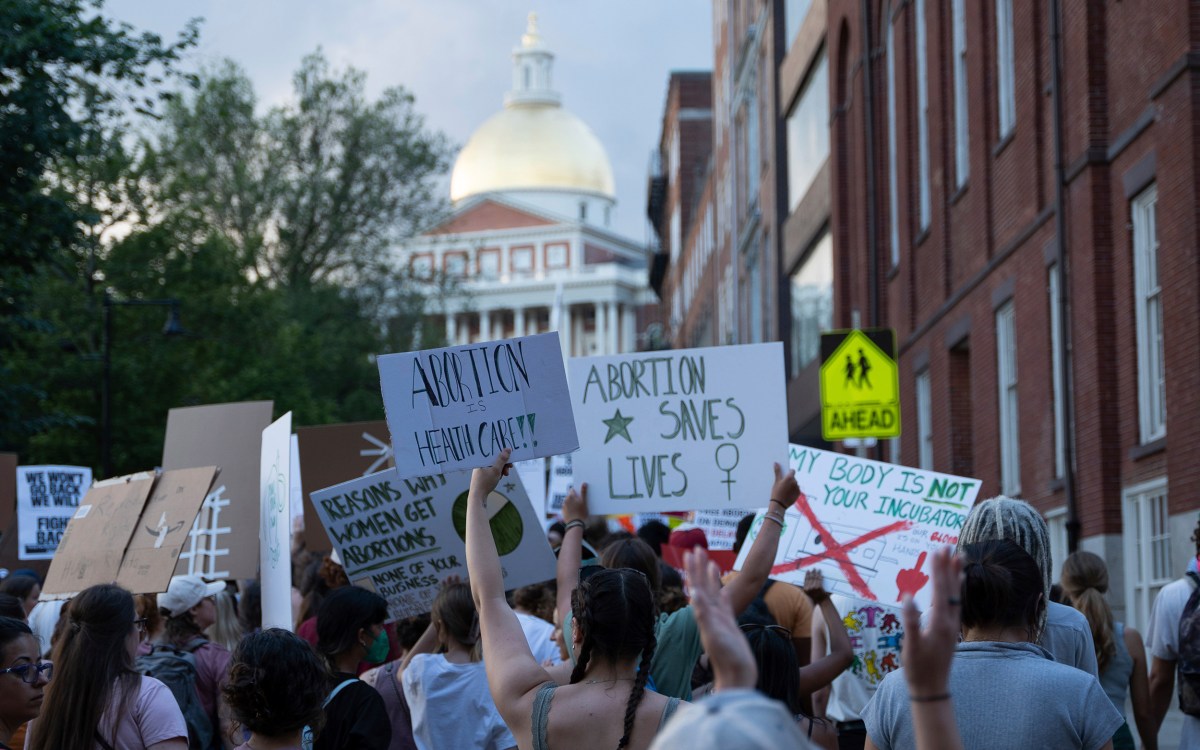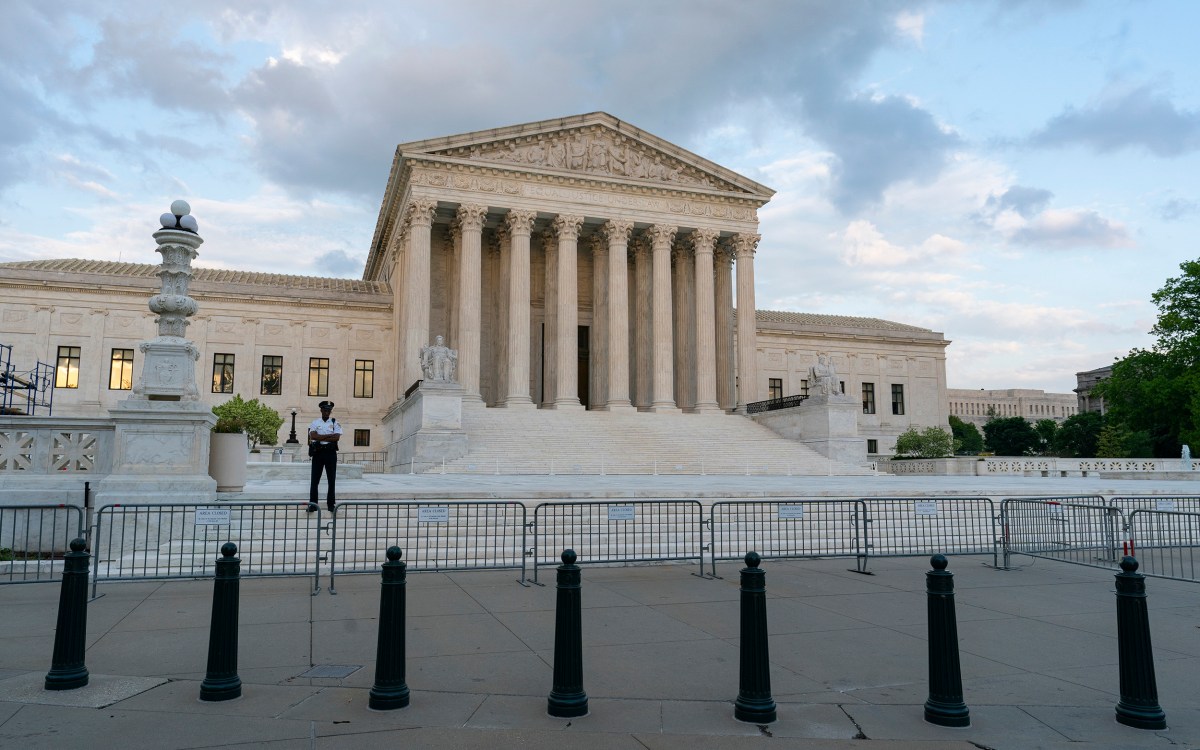
Texas Attorney General Ken Paxton (pictured speaking outside the Supreme Court earlier this year) filed suit last week against the federal government over its guidance about emergency abortions.
Bryan Olin Dozier/NurPhoto via AP
‘Life of the mother’ is suddenly vulnerable
Law School experts on how we define pregnancy threat amid emerging state-federal conflict in post-Roe U.S.
Even the staunchest abortion opponents once hedged when it came to saying the law should force a woman to continue a life-threatening pregnancy. But since the Supreme Court overturned Roe v. Wade last month, eliminating “life of the mother” exceptions in abortion bans is no longer seen as politically unthinkable.
Last week, Texas Attorney General Ken Paxton sued the federal government after the Department of Health and Human Services issued a reminder that doctors who perform abortions as part of emergency care for a mother are protected from criminal prosecution under federal law, even in states where the procedure has been outlawed. Any hospital that prevents physicians from performing an emergency abortion would lose its federal funding, the agency warned. The Department of Justice has formed a reproductive rights task force to monitor and assess state legislation around reproductive care, including abortion and access to contraception.
The Gazette asked two experts in reproductive law about the Texas lawsuit and how we define a health emergency. I. Glenn Cohen is the James A. Attwood and Leslie Williams Professor of Law at Harvard Law School and faculty director of the School’s Petrie-Flom Center for Health Law Policy, Biotechnology, and Bioethics. Alicia Ely Yamin is a lecturer at HLS, a senior fellow on global health and rights at the Petrie-Flom Center, and senior adviser on human rights and health policy at Partners In Health. Interviews have been edited for clarity and length.
Q&A
I. Glenn Cohen and Alicia Ely Yamin
GAZETTE: Other states are expected to join the Texas lawsuit and/or challenge other federal enforcement efforts. Where might this be headed?
COHEN: The district court will make a determination in the Texas lawsuit. Whoever loses is likely to appeal to the Fifth Circuit. To be sure, every issue is different, but the Fifth Circuit is probably one of the most advantageous courts for the kind of argument Texas is making.
If Texas wins in the Fifth Circuit, it will be up to the Biden administration to decide whether to seek certiorari in the Supreme Court. Given that this is an important plank of the administration’s plans to protect abortion, it is likely they would pursue it to the Supreme Court in such a circumstance, even if their chances of success are not great, but there is always a risk of a bad decision from the court for them having collateral consequences for other programs they are implementing. If Texas loses in the Fifth Circuit, it seems very likely, given their prior success in the Supreme Court, that they would seek certiorari.

I. Glenn Cohen and Alicia Ely Yamin.
File photos by Kris Snibbe/Harvard Staff Photographer; Harvard Law School
GAZETTE: What are some key legal questions or issues that may arise from this debate about the life of the mother exception?
YAMIN: Based on what we have seen in case law from other countries and international tribunals, I would expect that there are questions about the definition of what constitutes an emergency, and how imminent the threat to the life of the pregnant person is. But I’d also expect that there are questions about who decides the process for determining whether states will now put into effect protocols that say there has to be some kind of committee at each facility, so that individual doctors don’t have the power to make that decision in connection with their own patients. There may be multiple doctors who need to decide — maybe a judge needs to decide? We don’t know. But all those things have been tried in different countries.
Physicians have a lot at play in making a decision that could get their license suspended or put it at risk. All the chilling effects end up weaponizing health systems against women and pregnancy-capable people. When providers are assessing whether to do something or not, the risk-reward thing really operates to the detriment of the people who are seeking abortions. Because unless the provider is a champion of women’s reproductive justice, there’s no benefit to going out on a limb.
GAZETTE: Are terms like “the life of the mother,” “emergency,” and “reasonable care” matters of settled law or could those be litigated and redefined by legislatures on a state-by-state basis?
COHEN: The terms, tests, and case law vary significantly by state. In some states, things are clearer in the way the statute is written. In some states there has traditionally been significant deference given to physician judgment, and in some states, multiple physicians must agree. I would expect litigation to first emerge in states that are (1) becoming more restrictive on abortion, (2) have less clear statutory language, and (3) where, in the past, there has been more deference to physician judgments. But it is too soon to tell.
“All the chilling effects end up weaponizing health systems.”
Alicia Ely Yamin
GAZETTE: The World Health Organization defines “the life of the mother” as conditions that affect either physical health or mental health. But it’s an expansive definition not every country shares …
YAMIN: We’ve heard from certain legislators here that they want to eliminate the mental health exception, so that would open a big loophole. That has been variously interpreted by different courts around the world and it’s been deeply contested, even when there are questions of possible suicidal ideation. Some courts have a kind of temporal rule, where if the woman is suicidal and might kill herself during the pregnancy, then it becomes part of physical health. But in other places, courts have been unwilling to extend “health” to mental health concerns and that, of course, is very concerning.
GAZETTE: With potential circuit conflicts and an array of knock-on effects that are likely to occur when state laws vary so widely, how likely is the Supreme Court to consider challenges to foundational matters like interstate commerce and Americans’ freedom to travel within the U.S.?
COHEN: The cases that are most likely to make it up to the court in the near future are going to be about pre-emption. Both the Texas case and then other cases about whether the approval by FDA and REMS [Risk Evaluation and Mitigation Strategy] around mifepristone [oral abortion medication] pre-empt contrary state laws that restrict medical abortion. Circuit splits are possible, but it will depend in part on whether conflicting precedent emanates from the circuits quickly or whether the Supreme Court reaches out to decide the matter before they do.
Questions about travel to other states may come in the future but would depend on a state first taking an aggressive stand on prohibiting travel for abortion or seeking to apply extraterritorially its criminal law on abortion to conduct partially in another state. Justice Kavanaugh’s Dobbs concurrence signaled he thought interstate travel for abortion was constitutionally protected, but it is less clear if his statement encompasses the question of extraterritorial application of state law. Kavanaugh plus the three more liberal justices would not be enough to resolve the case in favor of interstate travel, but it is possible that restricting going out of state for an abortion would be a bridge too far for Chief Justice Roberts at least.
“Questions about travel to other states may come in the future but would depend on a state first taking an aggressive stand on prohibiting travel for abortion.”
I. Glenn Cohen
GAZETTE: The U.S. is just now wading into this politically fraught area of reproductive law. How has this issue played out internationally?
YAMIN: In international law where there are “exceptions to criminalization,” sometimes they preserve a right to abortion in cases that affect the life or threaten the health of the pregnant person, and sometimes, in cases of rape or incest. Sometimes those exceptions apply in cases of congenital anomalies inconsistent with life. Virtually all abortion bans around the world, with very few exceptions, have what’s called an indication or exception to criminalization to preserve the life of the woman. That has been interpreted variously by courts, say the European Court of Human Rights, in different ways. In some countries, it is defined. For example, if it is an ectopic pregnancy, if the woman has a cervical cancer, if the woman has pre-eclampsia, which is an obstetric emergency that requires delivery immediately. In some cases, it has not been defined in legislation, and courts like the European Court of Human Rights don’t view it as appropriate for courts to be weighing in and making those determinations. Those are determinations generally made by the person’s own physician or an emergency room physician.
GAZETTE: Should a majority of U.S. states make no abortion exception for the mother’s life, what kind of company would we be keeping globally?
YAMIN: Just a few countries: Somalia, El Salvador, Nicaragua, Malta. Sierra Leone just decriminalized abortion because their law, which had been imposed in 1861, was considered to be an outdated, colonialist rule. We’d be in the company of very few and not democratic states and completely out of line with international law and trends in comparative law.







